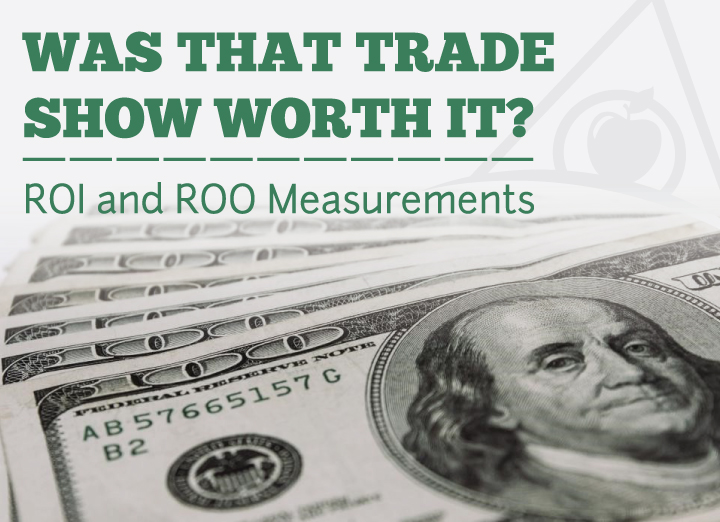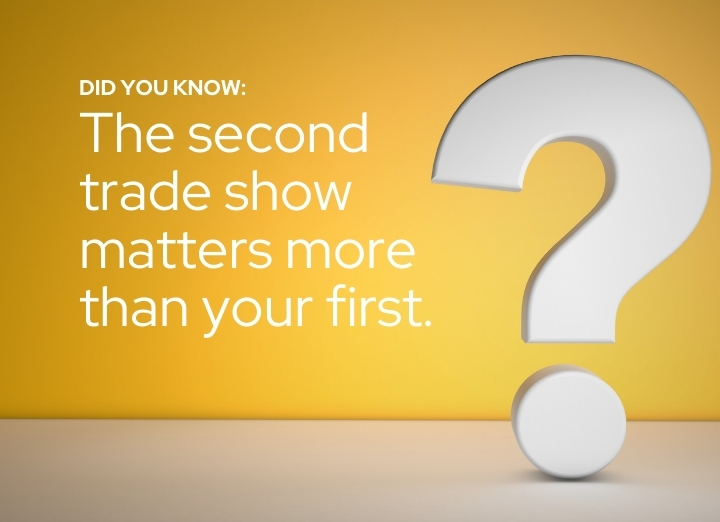Jubilation! The huge trade show is over and your database is full of juicy, qualified leads. You networked your butt off. That product launch generated buzz in the building as well as on Twitter. High fives all around!
Now comes the call from the boss: “What is the ROI and ROO on the show? Was our money well spent? Should we participate in the show next year?”
It can be stressful understanding how to measure and report about leads generated, brand awareness raised and beneficial leads and networking accomplished. You must be able to demonstrate success. Fear not! The most common ways to quantify success for any trade shows are Return On Investment (ROI) and Return On Objectives (ROO).
What’s the difference between ROI and ROO?
ROI compares the costs associated with being in a show to the actual revenue generated in sales. Measuring ROI can be a lengthy process depending on the sale cycles of your industry and how long it takes for the buyer to commit. ROO is more empirical in nature and measures how well marketing objectives are working in the trade show environment and how those efforts continue to influence out in the marketplace.
The ROI formula is:
Revenue – Investment Example: $40,000 – $20,000 = 1, making the ROI 100%
Investment $20,000
Cost Per Lead formula:
Cost of Show Example: $ 20,000 = $67 per lead
Leads 300
ROO is a measurement used when your goals are not directly tied to sales. There is no mathematical formula for ROO, which is why it is so important to establish these types of goals far in advance so management can all be on board with the objectives. These include brand exposure campaigns like raising social media awareness, product launches or services showcasing, networking and other more esoteric goals. Here are a few ROO goals and ways to measure success.
| Trade Show Goal | Measurement |
| Generate 100 Qualified leads | Examine the Quantity and Quality of leads generated based on company guidelines. |
| Build Brand Awareness by 20% |
|
| New Product Launch or Demo | Physically count the number of people who were at the demo or introduced to the product. |
| Media Exposure | Monitor outside social media mentions, news articles, blogs and other PR instances generated from the event. |
| Networking | How many other industry professionals did you meet? |
| Publicity | How many newspapers, magazines or news programs was your company featured in? |
Too often, exhibitors don’t think about ROI in the planning stage. This step is critical to accurately assess financial profitability from exhibiting in a trade show. As with all aspects of your trade show program, leaving enough lead time is key to increasing your program ROI and ROO by taking advantage of huge early cost savings like Advance Warehouse opportunities.
When you first identify the goals and objectives you want to accomplish while exhibiting at the show, you should quantify them as much as you can to make the measurement process easier. For example, if your goal is to generate qualified leads, assign tangible and realistic numbers, such as generating 400 qualified leads. Or are your goals more about brand exposure, PR and networking?
Any trade show program must set goals and assess the outcome of each. Measuring trade show success, whether with ROI or ROO, allows your company to justify the financial spend on each show and the campaign as a whole. It also gives valuable data and insight into evaluating, planning and implementing new and better strategies for the next event.
It is important to determine outcomes as soon as possible when returning from a show, so you can pinpoint the areas that need improvement. Have a clear idea about your sales cycle and how long it may take for a lead to bear fruit. Understand what brand exposure and PR means to your organization.
And again, a word to the wise – Start Early and save money, headaches and stress when building your trade show marketing campaigns. Your ROI and ROO will grow when the process is not rushed.






